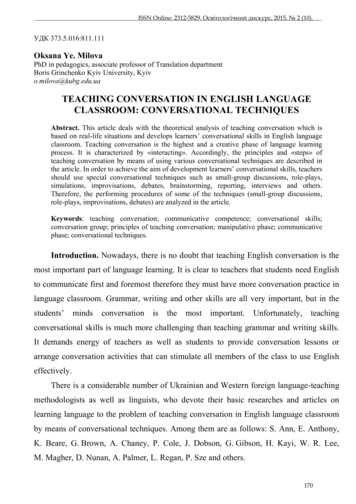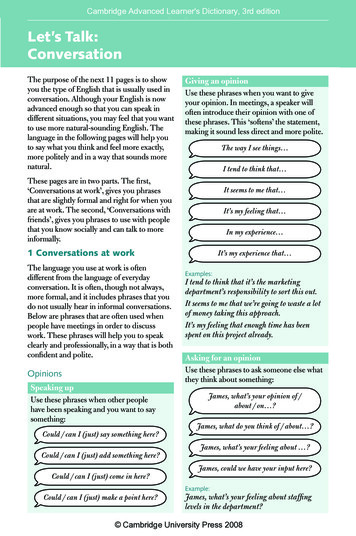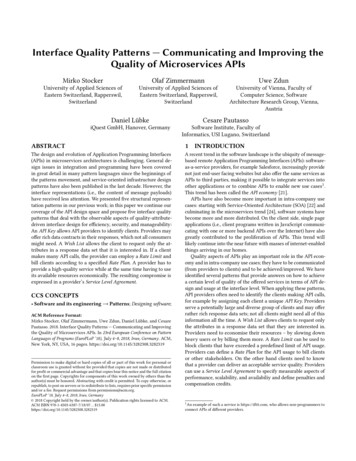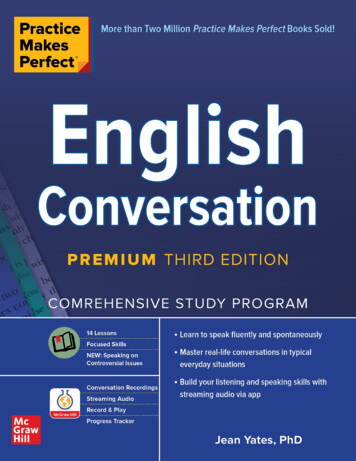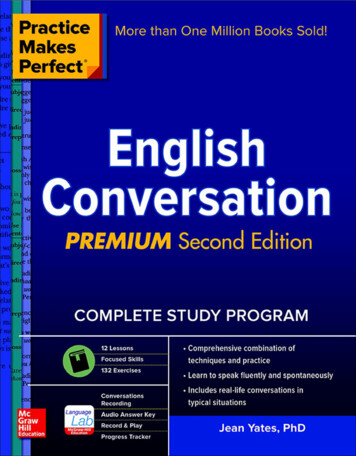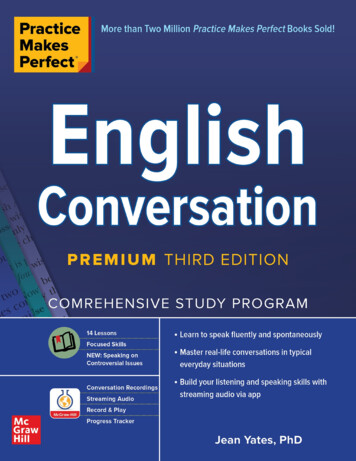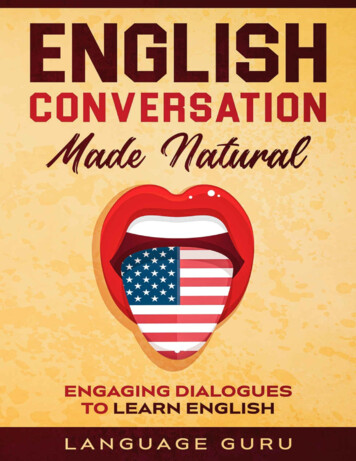
Transcription
ENGLISH CONVERSATION MADE NATURALEngaging Dialogues to Learn EnglishLanguage GuruFIRST EDITION
Copyright 2020. All rights reserved. This book or parts thereof may not bereproduced in any form, stored in any retrieval system, or transmitted in anyform by any means—electronic, mechanical, photocopy, recording, or otherwise—without prior written permission of the publisher, except as provided byUnited States of America copyright law.
Books by Language GuruEnglish Short Stories for Beginners and Intermediate LearnersSpanish Short Stories for Beginners and Intermediate LearnersFrench Short Stories for Beginners and Intermediate LearnersItalian Short Stories for Beginners and Intermediate LearnersGerman Short Stories for Beginners and Intermediate LearnersRussian Short Stories for Beginners and Intermediate LearnersPortuguese Short Stories for Beginners and Intermediate LearnersKorean Short Stories for Beginners and Intermediate LearnersFluent English through Short StoriesFluent Spanish through Short StoriesFrench Short Stories for Intermediate LearnersItalian Short Stories for Intermediate LearnersSpanish Conversation Made NaturalFrench Conversation Made NaturalItalian Conversation Made Natural
German Conversation Made NaturalRussian Conversation Made NaturalPortuguese Conversation Made NaturalKorean Conversation Made Natural
Table of ContentsIntroductionHow to Use This BookChapter 1: Changing MajorsChapter 2: Gaming SessionChapter 3: Convenience StoreChapter 4: On the ClockChapter 5: Chatting with ClassmatesChapter 6: The Secret IngredientChapter 7: A Date with a StrangerChapter 8: Pumping IronChapter 9: The Latest TrendChapter 10: The Meaning of SacrificeChapter 11: Chatting with CustomersChapter 12: Checking Out BooksChapter 13: Family TimeChapter 14: The Definition of GeniusChapter 15: Filling a PrescriptionChapter 16: Interview with a Witness
Chapter 17: Combining ForcesChapter 18: Ordering LunchChapter 19: Running for PresidentChapter 20: Study HallChapter 21: From a Foreign LandChapter 22: Home Sweet HomeChapter 23: Ice Cream BreakChapter 24: Escaping RealityChapter 25: Car RepairsChapter 26: A Second OpinionChapter 27: Leaving the NestChapter 28: The Big PromotionChapter 29: Your Free ConsultationChapter 30: Interview with a PolyglotDid You Enjoy the Read?Answer Key
INTRODUCTIONWe all know that immersion is the tried and true way to learn a foreign language.After all, it's how we got so good at our first language. The problem is, it'sextremely difficult to recreate the same circumstances when we are learning oursecond language. We come to rely so much on our native language foreverything, and it's hard to make enough time to learn the second one.We aren't surrounded by the foreign language in our home countries. Moreoften than not, our families can't speak this new language we want to learn. Plus,many of us have stressful jobs or classes to attend. Immersion can seem like animpossibility.What we can do, however, is to gradually work our way up to immersion,no matter where we are in the world. The way we can do this is throughextensive reading and listening. If you have ever taken a foreign language class,chances are you are familiar with intensive reading and listening. In intensivereading and listening, a small amount of text or a short audio recording is brokendown line by line, and every new word is looked up in the dictionary.Extensive reading and listening, on the other hand, is quite the opposite.You read a large number of pages or listen to hours and hours of the foreignlanguage without worrying about understanding everything. You look up as fewwords as possible and try to get through material from start to finish as quicklyas you can. If you ask the most successful language learners, you'll find that thebest results are delivered not by intensive reading and listening but, rather, byextensive reading and listening. Volume is exponentially more effective thantotal comprehension and memorization.If you cannot understand native English speakers, it is precisely because ofa lack of volume. You simply have not read or listened enough to be able toinstantly understand people like you can in your native language. This is why it'sso important to invest as much time as possible into immersing yourself in native
English every single day.To be able to read extensively, you must practice reading in the foreignlanguage for hours every single day. It takes a massive volume of text beforeyour brain stops intensively reading and shifts into extensive reading. Until thatpoint, be prepared to look up quite a few words in the dictionary.This book provides a few short English-language dialogues that you can useto practice extensive reading. These conversations were written and edited bynative English speakers from the United States. They use 100 percent realEnglish as used by native English speakers every single day.We hope these dialogues help build confidence in your overall readingcomprehension skills and encourage you to read more native material. We alsohope that you enjoy the book and that it brings you a few steps closer toextensive reading and fluency!
HOW TO USE THIS BOOKTo better simulate extensive reading, we recommend keeping things simple andusing the dialogues in the following manner:1. Read each conversation just once and no more.2. Whenever you encounter a word you don't know, first try to guess itsmeaning by using the surrounding context before going to the dictionary.3. After completing the reading for each chapter, test your understanding ofthe dialogue by answering the comprehension questions. Check your answersusing the answer key located at the end of the book.We also recommend that you read each conversation silently. Whilereading aloud can be somewhat beneficial for pronunciation and intonation, it's apractice aligned more with intensive reading. It will further slow down yourreading pace and make it considerably more difficult for you to get intoextensive reading. If you want to work on pronunciation and intonation, a betteroption would be to speak to a tutor in the foreign language so that you canpractice what you have learned.Memorization of any kind is completely unnecessary. Attempting toforcibly push new information into your brain only serves to eat up your timeand make it that much more frustrating when you can't recall the information inthe future. The actual language acquisition process occurs subconsciously, andany effort to memorize new vocabulary and grammar structures will store thisinformation only in your short-term memory.If you wish to review new information that you have learned from thedialogues, several other options would be wiser. Spaced Repetition Systems(SRS) allow you to cut down on your review time by setting specific intervals inwhich you are tested on information to promote long-term memory storage. Ankiand the Goldlist Method are two popular SRS choices that give you the ability to
review whatever information you'd like from whatever material you'd like.Trying to actively review everything you learned through theseconversational dialogues will slow you down on your overall path to fluency.While there may be an assortment of things you want to practice and review, thebest way to go about internalizing new vocabulary and grammar is to forget it! Ifit's that important, it will come up through more reading and listening to othersources of English. Languages are more effectively acquired when we allowourselves to read and listen to them naturally.With that, it is time to get started with our main character Charlie and hisstory told through 30 dialogues. Good luck, reader!
CHAPTER 1:CHANGING MAJORS(Charlie has come to the student counseling office to change his major.)Charlie: I'm just not sure what kind of work I want to do.Counselor: And that's perfectly normal. A lot of us drift around in life trying tofigure out where we belong.Charlie: Well, it's certainly not chemistry. I can tell you that. I was really goodat it in high school, but I just don't think I can do it for the rest of my life.Counselor: I wish I could tell you what your true passion is. If I could, thiswhole "choosing a major and career" thing would be much more straightforwardnow, wouldn't it?Charlie: You really need a crystal ball at your desk.Counselor: I know, right? I might as well come to work dressed in a wizard'srobe and hat, too.Charlie: Definitely. For now, I think I'll switch my major to "undecided" and doa little soul searching.Counselor: That's OK. That's exactly what college is for.
Comprehension Questions1. What was Charlie's original major before he decided to switch?A. HistoryB. ChemistryC. CounselingD. Wizard2. What major did Charlie decide to switch to?A. ChemistryB. CounselingC. HistoryD. Undecided3. If someone is doing some “soul searching”, what do they really mean?A. They lost their soul and are now searching for it.B. They are searching for the love of their life.C. They are taking time to think over their emotions and motives.D. They are hunting ghosts.
CHAPTER 2:GAMING SESSION(Charlie goes over to his best friend Ben's house to hang out and play videogames.)Ben: Bah! I died again. This level is way too hard, man.Charlie: Look. We don't have any teamwork. We're never gonna beat this bossby acting separately.Ben: Our characters are like oil and water. They don't mix together.Charlie: What if I distract him while you deal as much damage as possible?When he starts targeting you, we will change places.Ben: So, like a game of cat and mouse?Charlie: Yeah, but there are two mice. And the mice have weapons.Ben: Let's try it.(The two resume playing.)Ben: Hey, we did it.
Charlie: Yay!Ben: I can't believe that actually worked. That was great! Yo, we should go outand get a snack to celebrate.Charlie: Alright. Let's go.Comprehension Questions1. Which two substances do not mix well together?A. Oil and waterB. Salt and waterC. Sugar and waterD. Fire and water2. How do the boys defeat the boss in the game?A. They go get snacks to celebrate.B. They work together as a team.C. They act separately.D. They buy better weapons.3. How do Charlie and Ben celebrate their victory?A. They bump their fists.B. They play some music.
C. They go out and get snacks.D. They don't celebrate their victory.
CHAPTER 3:CONVENIENCE STORE(The two are inside their local convenience store browsing the store'sshelves.)Charlie: So, what do you want to eat?Ben: Let's get sandwiches.(The boys bring their purchases to the check-out counter. After paying fortheir food, they go out to eat in Charlie's car.)Ben: Wow, this is really good. Is that avocado I taste?Charlie: Avocado and red pepper, I think.Ben: So, what's going on with you lately? You said that you changed majors.Charlie: Yeah. I have no idea what I want to do.Ben: Same. I don't even want to think about it.Charlie: You eventually have to, right?
Ben: Nope.Charlie: How about when you turn 30?Ben: Not then either.Charlie: 80?Ben: I will be a gamer to the day I die. You'll be prying the controller out of mycold, dead hands when I'm gone.Comprehension Questions1. In a convenience store, where do you usually pay for your purchases?A. At the doorB. At the officeC. In the storage roomD. At the check-out counter2. Which item are you NOT likely to find in a convenience store?A. SandwichesB. SnacksC. DrinksD. Controllers
3. Where do the boys eat their sandwiches?A. Inside the convenience storeB. Inside Ben's carC. Inside Charlie's carD. Inside the sandwiches
CHAPTER 4:On the Clock(Charlie works at a local pizza delivery shop as a part-time delivery driver.Inside the store, Charlie and the pizza store's general manager are chattingwhile folding pizza boxes.)Lucy: So, I fired him. I understand that things come up, and some days you aregoing to be late. But a no-call, no-show is inexcusable.Charlie: I see. He was friendly and fun to be around, but a no-call, no-show ispretty bad.Lucy: It happens from time to time. So many college kids work here, and someof them want to party all night. Then they are too hungover or tired to come towork. I wish they would just call in at the very least.Charlie: Wow, I think you're the most lenient boss I've ever had.Lucy: Oh no. I would still fire them if I knew that was the reason they called in.We need a reliable team to run this place.Charlie: Remind me to never get on your bad side.Lucy: You'd be one of the first ones I would promote, honestly.
Charlie: Really?Lucy: A second manager would be nice. I'm here every day, and it's not good formy mental health. I need the time off.Charlie: Wow. I don't even know what to say.Lucy: You don't have to. The next order is ready. Go deliver it.Comprehension Questions1. What is a “no-call, no-show”?A. An employee being firedB. An employee's absence from work without notifying the employerC. An unwritten rule at a workplaceD. A rule forbidding the use of smartphones in the workplace2. What is the opposite of “lenient”?A. StrictB. StraightC. SmartD. Supreme3. Why does Lucy want to hire a second manager?
A. She wants to be able to compete with the other local pizza deliverystores.B. She wants to be promoted.C. She wants to quit.D. She wants to take time off work for her mental health.
CHAPTER 5:CHATTING WITH CLASSMATES(Charlie is at school attending an economics lecture.)Professor: That will be it for today. Don't forget to study for the upcomingmidterm. For every hour you spend here, you should spend at least two hoursreviewing.(The students start packing up their belongings and leaving the lecture hall.A student to the left of Charlie starts up a conversation.)Classmate: Two hours? That's way too much! We all have lives, you know?Charlie: Yeah, it's a lot.Classmate: I get that we have to study to get a good grade and all, but dude.Charlie: And it's an economics class, which most people here are not majoringin. What major are you?Classmate: Engineering. You?Charlie: Undecided, so I'm kind of just floating around for now.Classmate: I see. Yeah, there's so much going on campus every single day. Did
you hear about the 48-hour film festival coming up this weekend?Charlie: That's the one where each team has 48 hours to make a movie, right? Idid hear about that. Are you going?Classmate: Sure am. Gonna enter with some friends and see what happens. Howabout you?Charlie: Nah, I can't do anything film-related at all. I'm not even sure I wouldlast 48 seconds before screwing something up. I have been thinking about takingup cooking classes, though.Comprehension Questions1. According to the professor, if you spent 10 hours in class, how many hoursshould you review for the midterm?A. 10 hoursB. 15 hoursC. 20 hoursD. 25 hours2. Which of the following is NOT a college major?A. UndecidedB. EconomicsC. EngineeringD. Studying
3. What happens at a 48-hour film festival?A. People gather in a large theater to watch films for 48 hours straight.B. People gather to watch the premiere of a new movie that is 48 hours inlength.C. Teams enter to create and compete for the best film in under 48 hours.D. Teams enter a 48-hour ultra-marathon race and capture it on film.
CHAPTER 6:THE SECRET INGREDIENT(Charlie attends an evening cooking class located inside the student centeron campus.)Instructor: The onions are the most important part of this recipe. They have tobe seasoned properly, or the curry will not have as much flavor.Student #1: So, you add salt, pepper, garlic, and ginger when cooking theonions?Instructor: Yes, and now comes the secret ingredient.Student #2: What's the secret ingredient?Instructor: It wouldn't be a secret anymore if I told you.Charlie: But how are we supposed to make this dish at home?Instructor: The person who guesses the secret ingredient gets a prize!Student #1: OK. Is it coconut?Instructor: No.
Student #2: How about olive oil?Instructor: Try again.Charlie: Is it love?Instructor: That's the secret ingredient in everything, so nope.Student #1: Ice cream?(The instructor coldly stares at Student #1.)Charlie: I think he means to say that we all give up.Instructor: Very well then. The correct answer is basil. And since no oneguessed right, it looks like I will be keeping the prize to enjoy all by myself.Comprehension Questions1. What does the instructor season the onions with?A. Salt, pepper, garlic, and gingerB. Salt, pepper, and olive oilC. Salt, pepper, and coconut oilD. Ice cream2. Where is the cooking class located?
A. Inside the student center off campusB. Inside a lecture hallC. Outside the student center off campusD. Inside the student center on campus3. What was the prize for guessing the secret ingredient?A. BasilB. CashC. Ice creamD. Unknown
CHAPTER 7:A Date with a Stranger(Charlie has met someone online through a dating app. After chatting for afew days, they agree to meet in person for a date at a local coffee shop.)Charlie: Hi, are you Angela?Angela: Yes. Hi.Charlie: I'm Charlie. Nice to meet you.Angela: Nice to meet you, too.Charlie: You look a lot cuter in person.Angela: Oh, thanks. You, too.Charlie: So, uh, do you come to this coffee shop a lot?Angela: Yeah, sometimes.Charlie: When?
Angela: After school.Charlie: Oh, that's cool. What is your major?Angela: Computer science.Charlie: How's that working out for you?Angela: It's kind of fun, I guess.Charlie: What got you into that?Angela: Um, well, it pays pretty well.Charlie: It does, doesn't it?Angela: Yup.Charlie: You got gotta love jobs that pay you good money.Angela: Mmmhmm.(The two sit in awkward silence for roughly 10 seconds.)Angela: Oh. Uh, I just got a text from a friend. I think I should go meet them.Charlie: Oh, OK. Well, it was nice meeting you.(Angela picks up her belongings and leaves the coffee shop. Charlieimmediately takes out his smartphone and starts to ponder what went
wrong.)Comprehension Questions1. Where did Charlie first meet Angela?A. At the cooking classB. During one of his classesC. They both work at the same pizza delivery place.D. Through an online dating app2. How would you describe the general tone of the conversation in this chapter?A. AwkwardB. SeriousC. ArrogantD. Intimate3. When will the second date between Charlie and Angela occur?A. When Charlie gets his next paycheckB. Sometime during the weekendC. When the semester endsD. There probably won't be a second date.
CHAPTER 8:PUMPING IRON(Charlie has decided to start working out at the college gym on campus. Heis just about to start lifting weights when he decides to ask for help.)Charlie: Excuse me. Sorry to bother you.Stranger: No problem. What can I do for you?Charlie: I just started weight training today, and I was wondering, how did youget so lean and shredded? It's really impressive.Stranger: Oh, uh, thanks. It takes hard work and time just like anything else.Charlie: Let's say you had eight weeks to get into shape starting from scratch.What would you do?Stranger: Well, you're going to get pretty limited results if you work out foronly eight weeks. The fitness industry would have you believe that you can get aprofessional model's physique in eight weeks if you just buy what they areselling.Charlie: I don't know. I've seen a lot of amazing before-and-after photos.
Stranger: That's another trick. Those paid actors already had a lot of muscle onthem before they went on a diet to cut all the fat.Charlie: Alright then. What kind of eight week program would you recommendfor a beginner?Stranger: I'll tell you what. If you start with the basics and do heavy squats,deadlifts, and bench presses, you'll see some very real strength and size gains.Charlie: OK. Can you show me which machines I use for those?Stranger: These are barbell exercises. You'll get triple the gains if you train withthe barbell.Charlie: I don't know. That seems pretty hard.Stranger: It's supposed to be. That's exactly how you get big and strong.Charlie: I'll keep that in mind. What would you do diet-wise?Stranger: You're going to want to eat a small calorie surplus that's about 200300 calories above what you normally eat. And not junk food but nutritious foodthat's also high in protein.Charlie: Do you mean I have to count calories?Stranger: You don't have to necessarily. Start by cutting all junk food from yourdiet and replacing it with lots of healthy foods.Charlie: OK, I see. I really appreciate the help. I'll see what I can do.
(Overwhelmed by the information given to him by the stranger, Charliedecides to go for a run on the treadmill instead.)Comprehension Questions1. Which of the following most accurately describes the stranger's physique?A. Massive and bulkyB. Slim and muscularC. Frail and skinnyD. Fluffy and flabby2. What does it mean “to get into shape”?A. To become physically more fit through exerciseB. To bend something into a particular shape so that it fits into somethingelseC. To become a shapeshifterD. To bend one's body to perform certain exercises3. The stranger recommends that Charlie do all the following EXCEPT.A. Eat nutritious foods at a caloric surplusB. Eat junk foods at a caloric deficitC. Cut out all junk foodsD. Do barbell exercises
CHAPTER 9:THE LATEST TREND(Charlie goes over to Ben's house to hang out for the night.)Ben: So, how did that date go this week with that girl?Charlie: Terrible. It didn't last longer than three minutes.Ben: Ouch. Was it one of those dates where it was immediately awkward?Charlie: Pretty much. I'm thinking it's because of the way I look, but you neverknow, right?Ben: At least you're putting yourself out there. You're bound to find someone ifyou keep trying.Charlie: What about you? I know you're low on money but.Ben: You just answered your own question.Charlie: How's the job hunt coming along?Ben: Good. Hey, did you hear about the announcement today?
Charlie: No. What was it?Ben: They announced the new RPG today. It looks absolutely insane. They evenhired a few A-list celebrities to do the voice acting. The hype surrounding thisgame is unreal. I pre-ordered it immediately after the press event ended.Charlie: The internet is always on fire over something. I still haven't played thebig game that came out this year. It's like, as soon I finish one game, 10 morepop up that people are telling me to play. I just can't keep up.Ben: I can.Charlie: How?Ben: Easy. Don't have a life. Do that and suddenly you have all the time in theworld. Problem solved.Comprehension Questions1. What does it mean “to put oneself out there?”A. To go outsideB. To escape dangerC. To make a considerable effortD. To put oneself into a dangerous situation2. What is an “A-list celebrity?”A. A celebrity currently at the top of their career
B. A celebrity who appears on a listC. A celebrity who got high test grades in schoolD. A celebration of celebrities3. What does it mean “to not have a life?”A. To be deadB. To be unconsciousC. To use up all of your player lives in a video gameD. To spend all of one's time doing nothing significant or meaningful
CHAPTER 10:THE MEANING OF SACRIFICE(Charlie is at work chatting with Lucy while folding pizza boxes.)Lucy: We have a lot of deliveries coming up tonight. It's going to be a busynight. I like it when it's busy. It means that time flies, and we get home beforeyou know it.Charlie: I heard you have a son. How old is he?Lucy: He just turned 15 the other day.Charlie: So, he stays home with his dad while you're here in the evening?Lucy: Honey, he has a father but not a dad.Charlie: So, you raised him all by yourself?Lucy: I did. Of course, my son doesn't see it that way. I had to go to work almostevery day to pay our bills, so we didn't get to spend too much time together. Mymom, his grandmother, is the one who looked after him while I worked.Charlie: But now he is old enough to stay home alone, right?
Lucy: Yes. It's good for my mom, who needed the break, but now he's lonely,you know?Charlie: That's rough.Lucy: We compete with two other pizza delivery places, and this job takeseverything I got just to keep this place in business. If I take even a day off, I geta call from the owner, and he never calls unless it's something bad.Charlie: Wow, that's a lot to deal with. If it makes you feel any better, one dayhe will look back and realize how much his mom sacrificed for him.Lucy: Can that day be today, please?Comprehension Questions1. Why does Lucy like busy nights?A. She makes the most money on those nights.B. Time goes by quickly, which means everyone gets to go home sooner.C. The owner comes to visit.D. It means that there will be a celebration party after work.2. How was Lucy's son raised?A. By Lucy and her husband who worked all the timeB. By Lucy, who worked all the time and by Lucy's mother, who watchedover him at home
C. By foster parents who watched over him at homeD. By an orphanage3. What happens if Lucy takes a day off?A. The pizza shop will catch on fire.B. The employees will protest.C. The owner will call her up and scold her.D. The customers won't order any food.
CHAPTER 11:CHATTING WITH CUSTOMERS(Charlie is out on a delivery. He arrives at the customer's apartment andrings the doorbell with the order in hand. A middle-aged man opens thedoor.)Charlie: Hi there. I have a pineapple pizza for apartment 312.Customer: That's me. Here's the money for the order. You can keep the change.Charlie: Thank you.Customer: You look like you're a student in college. Am I right?Charlie: Yes, sir.Customer: Best four years of my life right there. Live it up while you canbecause those golden years will be gone before you know it.Charlie: I will certainly try.Customer: What do you study?Charlie: I did chemistry for a bit, but now I'm not sure what I want to do.
Customer: Don't worry about that. You have your whole life to figure that out.You're young. Just enjoy the college life. Parties, drinking, new friends, and thewomen!Charlie: I will! Oh, by the way, if you don't mind me asking, what did youstudy?Customer: History. Although it did me no good in the end. I couldn't find a jobafter graduation, so now I'm a delivery driver too, actually.Comprehension Questions1. How did the customer pay for the pizza?A. By credit cardB. By checkC. By cashD. By money order2. What was the customer's advice to Charlie?A. Don't worry so much about his college major and instead party it up.B. Get into a long-term relationship quickly, settle down, and get married.C. Focus all of his attention and time on his studies.D. Focus on accumulating as much money as he can, so he can startpreparing for his future.
3. What was the customer's problem with studying history?A. He found it too boring.B. He found that the jobs relating to history didn't pay as much as hewanted.C. He couldn't find a job after graduating.D. He dropped out of college.
CHAPTER 12:CHECKING OUT BOOKS(Charlie is at the library on campus, looking for an inspiring book. He findsa book that he would like to read and goes to check it out.)Charlie: Hi, I'd like to check out this book.Librarian: OK. Do you have your student ID card?Charlie: Yes. Here you go.Librarian: All right. Let me just put this book under your name.(A few moments of silence pass.)Charlie: Hey, have you ever read anything by the author of this book?Librarian: Can't say that I have. What kind of author is he?Charlie: I've heard that he writes about the lives of people who have madehistory. So many people have recommended his books to me because of thepractical wisdom they contain.Librarian: Oh, that does sound good. I'm more of a fiction reader. I think allgreat stories have some underlying wisdom in them. But what I like about fiction
is that it's up to the reader to find and interpret that life lesson for themselves.Charlie: For me, because of school, I've always associated reading novels withboredom.Librarian: So, that's why you read non-fiction?Charlie: I don't really read much at all. This is the first book I've picked upoutside school.Comprehension Questions1. What do you need in order to check out a book from the college library?A. A student ID cardB. MoneyC. A driver's licenseD. A state ID2. What does the author of the book Charlie is interested in write about?A. About the lives of librariansB. About the lives of people who have made historyC. About the history of practical wisdomD. About the history of people and the world3. Why does the librarian prefer fiction?
A. It's more fun and exciting than non-fiction.B. It's up to the reader to find the wisdom and life lessons contained withinthe story.C. It has fantasy, sci-fi, and romance novels.D. It's overall wiser to read fiction than non-fiction.
CHAPTER 13:FAMILY TIME(Charlie is lying on the couch in the living room of his apartment, enjoyinghis new book, when his mom comes back from grocery shopping.)Mom: Hey, Charlie.Charlie: Welcome back.Mom: Thanks. The new grocery store here is so cheap. I love it!Charlie: Oh yeah? What did you buy?Mom: I got all our vegetables at half price. There's fresh radishes, pumpkins,and cabbage. I also got fruits for pretty cheap. We have apples, strawberries, andblueberries.Charlie: That sounds great. What are we having for dinner tonight?Mom: I was actually thinking about getting take-out tonight. How does soup andsandwiches sound?Charlie: I'd love some.
Mom: My pleasure. By the way, what class is that book for?Charlie: It's not for class. I got it at the library.Mom: Oh. Have you finished studying for the day?Charlie: Mom, I don't even know what I want to study.Mom: I thought you were doing chemistry.Charlie: Nah. I dropped it. I changed my major to undecided for now.Mom: Well, it's good that you're keeping your brain sharp. What do you thinkabout doing something else science-related?Charlie: Chemistry was the science I liked best, but I'm not sure it's my truepassion anymore.(Charlie buries his face into his book.)Charlie: Mom, why doe
This book provides a few short English-language dialogues that you can use to practice extensive reading. These conversations were written and edited by native English speakers from the United States. They use 100 percent real English as used by native English speakers every single day.
